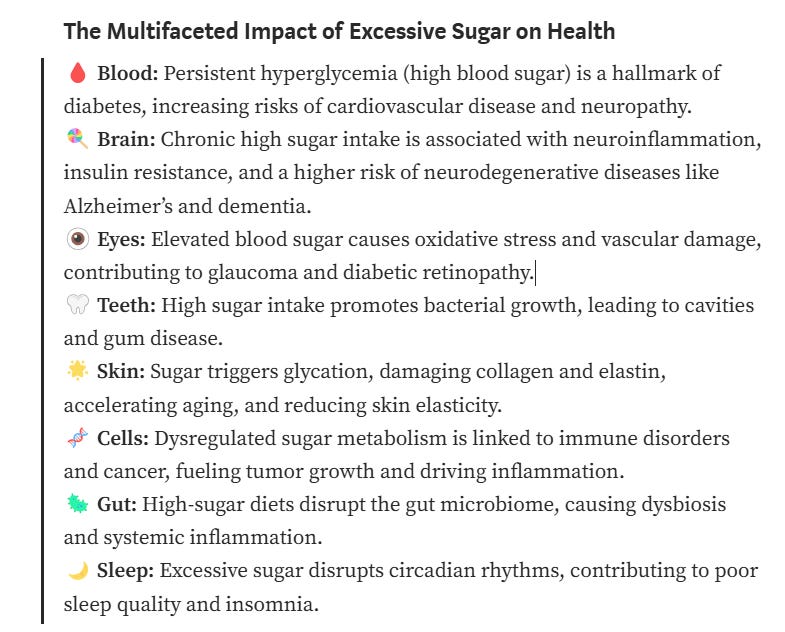Nuances of the Sugar Paradox: Balancing Its Essential and Harmful Effects on Metabolic and Mental Health
If we do not tackle the sugar crisis now, the growing wave of diabetes, fatty liver disease, heart disease, dementia, and cancer could spiral into an even greater health challenge.
I published this important story on Medium as more people need to learn about it for compelling reasons, which I explain clearly here.

Dear Subscribers, I hope this heartfelt post finds you in good spirits.
I recently shared a thought-provoking social media post highlighting the risks of excessive sugar consumption on our health. It sparked curiosity among my readers, some unaware of these impacts.
New readers asked if I had written anything about sugar in more depth. While I have explored this topic in different contexts before, I decided to simplify and expand on it in a story tailored for my readers.
By answering specific questions asked me before and sharing the lessons I have learned, I hope to equip readers with a balanced understanding of sugar’s role in their health and well-being. Together, we can explore how sugar can be both a friend and a foe and how mindful choices can help us find the right balance in our favor.
Here is the post that inspired this article, enhanced with icons to make it more eye-catching and memorable:
Sugar Can Be a Friend When Used Wisely
Glucose has become one of the most debated nutritional topics worldwide. Due to its profound health implications, sugar consumption has been regulated by law in some countries.
Issues related to sugar metabolism — such as elevated glucose levels in the bloodstream — and the resulting insulin resistance are central to several metabolic disorders, including obesity, fatty liver, and type II diabetes, which have reached epidemic proportions in many parts of the world.
Sugar’s impact is not just a theoretical topic for me. It has deeply influenced my life, inspiring me to learn how to manage it more effectively. Therefore, I looked at it from multiple angles, reading scientific and clinical papers.
Through this challenging and confusing journey, I gained insights that I believe can empower you to better understand the role of sugar in your lives. In this piece, I aim to provide a concise yet comprehensive, clearer, more nuanced, and informed perspective on the subject, offering real-world examples and actionable strategies.
In my previous articles, I wrote about the complexities of sugar metabolism and insulin resistance, focusing on how these factors shape metabolic health. However, the conversation does not stop there. I compiled relevant articles in a list for interested readers.
Excessive sugar consumption also affects mental health, with emerging research pointing to connections like the one between sugar and what some researchers refer to as type III diabetes — a term often used to describe the link between insulin resistance and neurodegenerative diseases.
The responses I received to my earlier stories were inspiring and thought-provoking. Many readers desired to dive deeper into how sugar influences metabolic and mental health, as they wanted to understand its dual potential to heal and harm when I talked about metabolic psychiatry.
I care deeply about it and have worked to manage my own challenges in my younger years. For example, excessive sugar made me prediabetic and gave me abdominal obesity. It also affected my loved ones, like my mother, who became diabetic, and my son, who had fatty liver disease at a young age.
The Vital Role of Sugar in Metabolism
Sugar is neither inherently good nor bad—it is simply a nutrient. Like water, salt, fats, or proteins, sugar can benefit our health when consumed mindfully.
Glucose, the simplest form of sugar, is indispensable for the body. It powers our cells and fuels the brain, which relies on it as its primary energy source. Sugar has been a cornerstone of our survival throughout evolution, providing the energy needed for endurance and growth.
Evolution even equipped us with a backup system—gluconeogenesis, a process that allows the body to produce glucose from non-carbohydrate sources like amino acids and fats during times of scarcity. This mechanism ensures survival even in the absence of dietary sugar.
But if sugar is so fundamental to life, why does it have such a controversial reputation?
The answer is in its overconsumption. Excessive sugar intake disrupts the body’s metabolic balance, contributing to serious health issues like type II diabetes, fatty liver disease, heart disease, strokes, certain cancers, and neurodegenerative diseases.
In this discussion, I aim to unpack the sugar paradox — how something so essential can turn harmful when misused. By understanding this delicate balance, we can make more informed choices about our health.
Why Sugar Is Paradoxical and How It Makes a Big Impact
Keep reading with a 7-day free trial
Subscribe to ILLUMINATION Health & Wellness Network to keep reading this post and get 7 days of free access to the full post archives.




